By Mark McGee
The sign on the storefront on the south side of the public Square in Shelbyville says “Marsha’s On The Square”. Nothing flashy. Just a simple black sign on a gray background. What a classic case of understatement. It gives no indication of the size of the company.
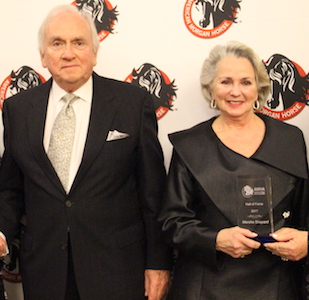
The sign should read Marsha’s On The Square and Everywhere.
The racks of ready-made riding suits and stacks of shirts, pants, vest, ties and hats on display are simply a microcosm of what the business offers.
Marsha Shepard, Scott Shepard and Ashlea Shepard are the faces of the company. The Marsha the sign refers to is actually Marsha De Arriaga whose name is on all of the labels of the custom made clothes.
Life on the farm
Back in 1979, Marsha Shepard began to venture into fashion after spending most of her life riding and training Morgan horses and Saddlebreds.
“We lived on a farm that had been in my mother’s family for hundreds of years,” Marsha said. “My mother and father (Vivian and Woodrow Henry) raised Morgans and American Saddlebreds. My mother’s theory was you sold them at age two because that was your biggest profit margin.
“We would breed maybe 10 of each, maybe 10 Morgans and 10 Saddlebreds. It just depended on the year. We had to get them ready to do something we thought they could do or tried to convince them they could do and sell them.”
The 500-acre farm was located in Amherst, Massachusetts. Horse enthusiasts were drawn to the farm and the horses bred there.
“The first horse shows were usually in July,” Marsha said. “People from all over the United States would come to look over Morgans in July. With the Kentucky State Fair later in the year they would come and look at the Saddlebreds.
“Our farm was called Bobbin Hollow. Every year we had Camp Bobbin Hollow for nine weeks. People who were campers have a Facebook account.”
Training to fashion
The career shift to fashion design was an easy one for Marsha.
“In 1979 I stopped training horses,” Marsha said. “I had decided I wasn’t going to get on two-year-olds anymore.”
She had been dabbling with fashion designs during her training days. She spent time in New York City honing her skills.
“I used to mess around with different people down there designing things and learning from them, and learning how to do patterns and sizing and all that good stuff,” Marsha said. “I started designing for a company called Latifa, a Carol Reed catalog manufacturing company. They also had horses in training with my family. I had decided that I wasn’t going to design riding clothes at all.”
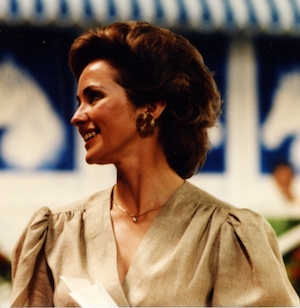
All of that changed. A trainer named Mike Goebig, who worked with Morgan horses at Broadmoor Stables in Lehigh County, Pennsylvania, prompted Marsha to expand her designing horizons.
“I had a line of fashions I was working on. I had a contract to do leather and suede clothes for Petite Limited. I also was designing for a fur company in Boston. Mike was a friend of mine. It is his fault I got into designing riding clothes. He said I know you make riding clothes for your family’s clients. I need you to come to Broadmoor to make riding clothes for my babies because I can’t find any patterns that actually account for a woman’s bust and help them have a waist.”
Marsha knew how to solve Goebig’s problem.
“In the 1960s all women’s riding suit patterns were made off a man’s business suit,” Marsha said. “They made an outfit that was adapted to a riding coat. We changed all of that. I was the first one to make a riding suit specifically tailored for a woman.”
It probably wouldn’t have happened without Goebig’s urging.
“When Mike said please come in and help us, I changed the design a little bit to make it like a man’s jacket for women,” Marsha said. “We changed the rotation for riding jacket sleeves. Rather than having your arms straight down like a sports coat the rotation of the sleeve rotated back so it automatically let your arms go forward.”
The idea didn’t develop from her time in the saddle. The spark was lit in a most unlikely place.
“I learned that from watching the conductor at the Boston Symphony Orchestra put his arms up to conduct the symphony,” Marsha said. “The back of his jacket never moved. I went to him and asked who did his jackets and I was sent to an Italian tailor in Boston. We incorporated it into riding and driving jackets, particularly for ladies when they drive.”
A major move
Marsha married Richard Shepard, a pilot for the now defunct Eastern Airlines. He developed a neuroblastoma and it was decided to move to Naples, Florida, for his health.
“We sold my farm, my family sold their farm and we sold the adjoining farm and moved to Naples,” Marsha said. “When Richard died was when I decided I was going to jump into designing head on.”
Her first connection was the late David Howard, founder of Dabora, Inc. and World Champion Equipment in 2000.
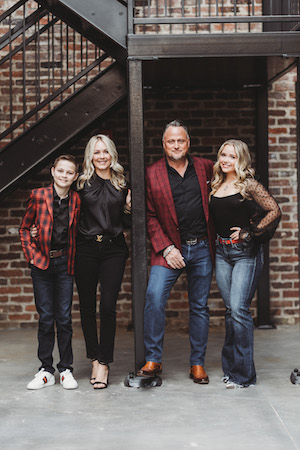
“David invited me up to do custom clothes at World Champion during The Celebration,” Marsha said. “I came up to Shelbyville and noticed it looked like Massachusetts with the rolling hills and streams, but no snow for three months.”
Scott liked the fact that the climate was better than in New England.
“The seasons are reversed,” Scott said. “Here you get three months of winter and the rest summer. In Massachusetts, you get three months of summer and the rest winter.”
The weather was always nice and warm in southern Florida, but Marsha soon tired of trying to travel around the country from Naples, near the end of Florida.
“I began to like it better and better here,” Marsha said. “I would come up for the Trainers’ Show. I would come up for The Celebration. The other part of living in Naples was that every weekend I was on the road going to Chicago, Massachusetts, Tennessee or California. I had clients all over the United States. It was difficult to get out of Naples on a flight. It could take a whole day to get out of Florida. Shelbyville was more centrally located.”
The move to the square
“My first Celebration was in 2000,” Marsha said. “We moved up here in 2004. I had no idea of what The Celebration was like until I came for the first time,” Marsha said. “I thought it was wonderful. The place was packed. It was like being at a football game. It was amazing. And the doughnuts were great. It was just a wonderful experience to get to know people and watch the horses.”
She might not have known what the Celebration was like, but she has been around Tennessee Walking Horses at shows most of her life.
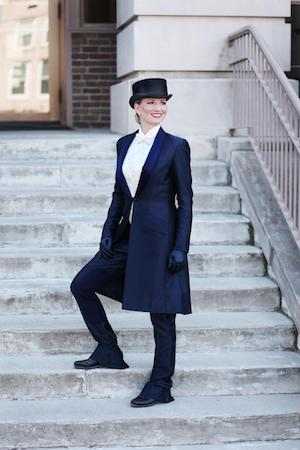
“I started riding when I was six,” Marsha said. “I grew up when we showed the breeds together in shows in New England and Pennsylvania. The first time I saw a walking horse in a show was in Louisville, Kentucky. The Tennessee Walking Horses came to our shows then. They were always there so it wasn’t that strange.
“I got to know Billy Boyd. If we ever had any trouble he was the first one to come over and help us with the horses. We got to be friends.”
Another walking horse trainer who made a positive impression early on Marsha was Allan Callaway.
“Allan was one of the first trainers who welcomed me here to Shelbyville,” Marsha said. “We showed together in Baton Rouge. It was not that big of a transition to be around walking horses here. They are very nice people. We enjoy working with them.
“I must say over the years I think the breed has gotten better. They are happier in the bridle. The breed has done nothing but improve itself.”
Clothiers to the equine industry
They may be based in the heart of Tennessee Walking Horse country, but Marsha’s caters to riders needs in a multitude of breeds.
“We do four different breeds at the moment – Walking Horses, Saddlebreds, Morgans and Arabians,” Scott said. “There are five major tailors in the world that make riding clothes. Of the five, we are the only one that manufactures our own clothes in our own factory. We cut out the middle man. We are the only one that has ready-made, and the only ones that do four different breeds all at once.”
The storefront offers a variety of choices, but the road is where the store makes its reputation.
“Eighty percent of our business is shipping out of state because of all the different breeds we serve,” Scott said. “We are probably on the road six or seven months out of the year. We will go up in the winter months to a particular stable area and send out a mass email to multiple barns and multiple farms. We will set up in New Hampshire, Massachusetts, Vermont, Maine and people will come and get fittings at a host farm. We are everywhere from California to New England to Florida.”
Quality always
Marsha De Arriaga was Marsha’s best friend in school. Every clothing item that bears her name is custom made by the company which employees many tailors. Arriaga’s first name is the one on the storefront as well.
“We don’t farm anything out,” Scott said. “We own our patterns. We have 17 master tailors and two who do finishing work. The master tailors go to the customers. The finishing work is done here in Shelbyville. We have grandfathers, fathers, sons, grandsons, sisters and brothers working for us.
“They do individual work. Some of them just make jackets. Some of them just make vests. Some of them just make pants. Some make hats.”
In addition, the company makes business suits under the Shepherds label, but it doesn’t stop there.
“We manufacture our own boots,” Scott said. “We manufacture our own hats from top hats to derby hats. We make chaps. We make western outfits. We make Hunting silks for jockeys, and English attire for saddle and hunt seat. We have our own line of ties because we couldn’t find ties that related to young ladies.”
Marsha added they have made gowns for women to wear in driving classes that could also be used to be in a wedding party.
The personal touch
Marsha’s deals with thousands of customers, but both Marsha and Scott stress they work with their customers on a personal basis.
“It is a very personal business,” Scott said. “Every client is different. No one wants to look like everybody else. We take the time to make sure our customers are fitted properly with what they want. If it is a custom design, we want it be custom. It is not custom if it is the same as the person next to you in the ring.”
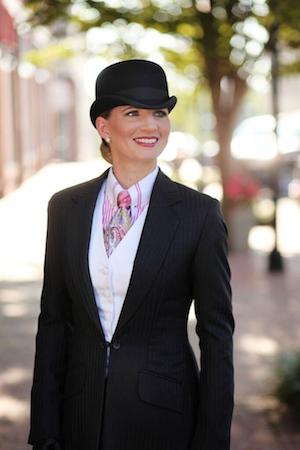
Marsha and Scott are always ready to travel to meet with customers. Ashlea Shepard, Scott’s wife, holds down the fort at the storefront on the Square. Scott calls her “Garcia” in reference to the character in in the television show “Criminal Minds” who was always at her computer and always had the answers.
“Everybody wonders how we keep up with all of this,” Scott said. “It is not easy. Keeping track of everything is hard. Garcia runs the show.”
Ashlea may have the true secret for why Marsha’s On The Square is such a success.
“We are all involved in the horse business,” Ashlea said. “With every single one of our customers there is a personal connection. Somebody at this table knows who is walking through the door or who is on the phone.”
And if they don’t have what you need, they can make it for you. After all it’s all about that personal touch.